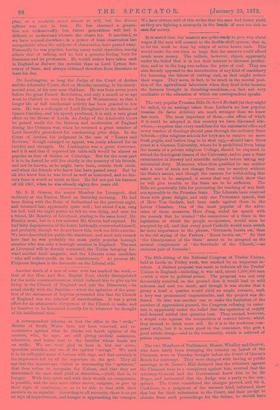The very popular Prussian Bills De Servd Ecclesitz (as they
might he called, by an analogy taken from. Luther's no less popular treatise De Servo Arbitrio) are much stronger than we knew last week. The most important of them,—the effect of which if it could be adopted in this country we have discussed else- where,—requires that every candidate for the ministerial office and every teacher of theology should pass through the ordinary State Schools,—(the religious schools, for boys are to receive no more fresh pupils, and before long to be shut up),.—should have three years at a German University, where he is prohibited from being the inmate of a private religious College, should be required to attend the theological classes of the University, and to pass a State examination in literary and scientific subjects before taking any ministerial duty. Moreover, when thus qualified he can neither take a cure of souls nor change from one to another without the State's assent, and though the reasons for withholding.that assent are to be assigned, it seems that any which show that he will give trouble to the State are to be sufficient. The Bills are practically bills for preventing the teaching of any faith not agreeable to the Prussian State. The Liberals have received them with great delight, and only one Protestant speeah, that of Herr Von Gerlach, had been made against them in the Lower Chamber. One of the most popular of the advo- cates of these measures, Herr Jung, ended his speech with the remark that he trusted "the omnipotence of a State in the legislation of which the people co-operates, would soon be accepted by all, and that every geed Catholic would soon attach far more importance to the phrase, ' Germania locuta est,' than to the old saying of the Fathers, ' Roma locuta est." So that the Omnipotence of the State' seems to be accepted as the natural complement of the Servitude of the Church,'—an ominous pair of formulae !


































 Previous page
Previous page